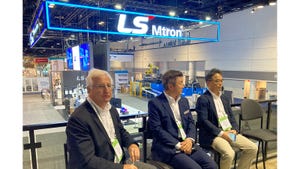Offshore training: prerequisite for success
October 1, 2005
A major consideration in the globalized plastics industry is the availability of a skilled workforce. In areas where manufacturing is long established, this may not pose such a big a problem. However, it''s critical in areas where the explosion of manufacturing technology is a relatively recent phenomenon. Often, the only way to get skilled employees is to train them yourself.
Andy Routsis, president of A. Routsis Assoc. (Dracut, MA), has been involved with workforce development for the plastics industry for nearly two decades. The trend he''s seeing is one wherein companies train their own employees in a plant-specific manufacturing environment, giving the company''s employees specific skills rather than depending on pirating employees from the plant next door-who often need training as well.
To help companies accomplish their offshore training requirements, Routsis sends training professionals to customers'' facilities in North America and Asia to develop customized in-house training programs designed to help achieve plant-specific training objectives.
"Companies located in low-wage countries need to get their employees up to speed very quickly to get faster returns on their personnel investment," says Routsis. "Using customized interactive training, advanced process simulation, and focused on-the-job training, we can develop a sustainable employee development system for virtually any plastics-based manufacturing facility."
Routsis recently participated in an SPE-sponsored, two-day plastics processing seminar with other technical experts, including Bob Hatch, at Texas State Technical College (TSTC) in Harlingen, TX. The seminar drew more than 125 people, 80% of whom traveled from Mexico. A translator worked on the fly with attendees using headsets. TSTC has a plastics program, and the school coordinates seminars between its school, the University of Texas in Brownsville, and South Texas Tech College in McAllen. Demographically, notes Routsis, there are about 150 injection molding firms on the U.S. side of that section of the border with Mexico, and 100 on the Mexican side, that take advantage of these programs.
When it comes to training, Routsis says the big difference he sees between workers in Mexico and the workers in China is that the workers in Mexico are looking to expand their skill sets, whereas in China the workforce tends to be very task-specific. "That''s something that many company managers don''t understand when putting manufacturing plants in those two countries," says Routsis.
Coming to the fore
Employee training has become a critical issue, particularly in low-wage countries, where many of the workers move from rural, agrarian cultures and regions to the larger cities to find factory work that pays better wages, as is frequently the case in China. Mexico has a longer history with manufacturing, and as Routsis points out, "they''ve always had their eyes on the U.S., and know that gaining skills through education and training programs is essential to remaining competitive in the global manufacturing economy."
United Plastics Group Inc. (UPG) puts a lot of effort into training its employees at its global facilities. The company has a molding plant in Monterrey, Mexico and is building a second facility just a few miles from the original plant. UPG currently has about 300 employees in Monterrey. In China, UPG is investing $10 million in a new facility in Suzhou. UPG''s relationship with A. Routsis is longstanding, notes Rey Parel, senior manager, advanced process engineering, global tooling/engineering, for UPG. "We''re trying to promote scientific molding as a core competency throughout our workforce," says Parel.
In essence, this kind of training is very critical to UPG and one of the lynchpins for ensuring the company''s success in its offshore facilities. "We''re seeing a skills gap-an advanced processing knowledge gap-that varies from area to area," explains Parel. "From my experience in both Mexico and China, there is much for them to learn, and training plays a critical role in that endeavor."
To be successful in training, and to get the most value, Routsis says that companies need to implement a formal, structured, in-plant training program customized to the facility''s specific requirements.
UPG''s Parel agrees. "Everyone at our plants goes through a formal training program, with our goal being to raise the skill level of all UPG personnel around the world," he says. "Our goal is to promote standardized customized training as one of the tools to achieve world-class molding status in every plant worldwide."
With 12 manufacturing plants worldwide, some specializing in medical, others in automotive, and some focusing on commercial products, customizing and standardizing UPG''s training program in each plant is critical to the success of the company as a whole. "As a global facilitator of training, I visit each facility and evaluate the skill levels of the personnel, and see what we need to do to improve our training program," Parel explains.
"In Monterrey, for example, it''s not just a skill level specific to Monterrey, but we''ll implement skills necessary for the processing engineers, QC engineers and inspectors, machine maintenance, our tooling group, our production employees, and machine operators to communicate more effectively with each other and with their counterparts in the U.S. facilities as well. That way, they''ll understand UPG''s plant systems, which raises the understanding of each of the personnel and results in a more efficient and cohesive plant."
UPG''s training programs, in addition to being customized for the plants, have a specific curriculum for each of the five groups named above, with the focus on employee retention and longevity of service. Additionally, the program is not dependent on a formal trainer, but uses interactive DVDs, and as each trainee is trained, he or she then becomes the trainer-or "facilitator" as UPG calls them. "This gives the program continuity and allows the transfer of information to flow smoothly from one group to another," adds Parel. "Also, it''s very adaptive to non-English speaking personnel."
Routsis says that a program of this type shortcuts the long learning process, giving the employees the knowledge they need quickly and efficiently, while giving the company immediate payback. However, a training program cannot be a short-term deal. "What happens with too many companies is they''ll get on a training kick-they''ll start something and in two weeks it''s over," notes Routsis. "To be effective, it has to be an ongoing program integrated as part of the corporate philosophy."
Clare Goldsberry [email protected]
You May Also Like


